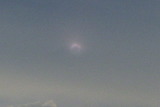
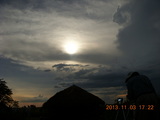

|
| Check out Nick's video |

|
I have stories of previous eclipse trips to (1) Aruba, (2) Hungary, (3) Zambia, (4) Australia, (5) Libya, (6) China, and (8) back to Australia. The third was on my own with a side trip to Victoria Falls, the fifth combined Africa with the middle east, plenty of stories to tell, and the seventh was a second trip to China without its own web page (but with pictures). Just think how much there will be to tell about a trip to the equatorial heart of the dark continent. It's going to be like another chapter of Holidays in Hell by P. J. O'Rourke.
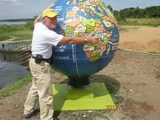 I'll cut to the chase so you don't have to read to the end.
The totality was all of eighteen seconds,
partially obscured by clouds but still visible
so I could look at the sun directly before and after totality.
The tour of Uganda from
Astro Trails
was a total success with little of the frantic schedule changes
required in
Libya.
Uganda is a fascinating country,
very poor but showing some serious signs of hope.
This is not the Uganda we remember of Ida Amin's
reign of terror.
I'll cut to the chase so you don't have to read to the end.
The totality was all of eighteen seconds,
partially obscured by clouds but still visible
so I could look at the sun directly before and after totality.
The tour of Uganda from
Astro Trails
was a total success with little of the frantic schedule changes
required in
Libya.
Uganda is a fascinating country,
very poor but showing some serious signs of hope.
This is not the Uganda we remember of Ida Amin's
reign of terror.
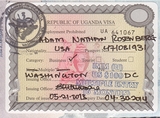 From the United States, a visa is required to enter Uganda.
I'm told one can get the required visa
at Entebbe Airport (EBB) for US $50,
I'm also told one can write to the Ungandan embassy,
but I decided to employ
CIBT
to do the paperwork for me.
They did the visa work for my trips to India and China
and it sure makes life easier.
From the United States, a visa is required to enter Uganda.
I'm told one can get the required visa
at Entebbe Airport (EBB) for US $50,
I'm also told one can write to the Ungandan embassy,
but I decided to employ
CIBT
to do the paperwork for me.
They did the visa work for my trips to India and China
and it sure makes life easier.
While I encountered very few insects on my trip to Uganda, I don't regret making medical preparations. I got my Flu, Typhoid (oral), and Yellow Fever inoculations renewed and my others were already up to date: Hepatitis A, Hepatitis B, Lyme disease, Meningococcal, Polio, Rabies, and Tetanus/Dipthereria/Pertussis. I got Larium (Mefloquine) pills to protect against Malaria and I'm lucky enough not to get nightmares from them. I also brought Ciprofloxican, Immodium, and Pepto-Bismol for any digestive ailments that might occur.
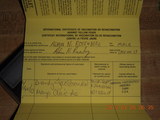 I have had the same
travel doctor
for about a decade.
He knows me, knows my general rhythm,
and knows that I'm a morning runner
who doesn't like indoor treadmills when I can run outside.
This time around, for Uganda,
he warned me that tsetse flies have painful bites,
carry diseases I really don't want to get,
and are attracted to dark blue.
I bought bright red and yellow running outfits
to replace the blue shorts and top I would normally have packed.
I have had the same
travel doctor
for about a decade.
He knows me, knows my general rhythm,
and knows that I'm a morning runner
who doesn't like indoor treadmills when I can run outside.
This time around, for Uganda,
he warned me that tsetse flies have painful bites,
carry diseases I really don't want to get,
and are attracted to dark blue.
I bought bright red and yellow running outfits
to replace the blue shorts and top I would normally have packed.
As for the trip itself, I let Astro Trails do the heavy lifting. Coming from Phoenix (PHX) I figured I would use my US Airways Dividend Miles to get me to and from London Heathrow Airport (LHR) and let them take care of me from LHR to Entebbe (EBB), Uganda and back, which they did marvelously (as usual). As PHX-LHR and LHR-EBB are both overnight trips, I decided to pad my trip with an extra day in London, Tuesday morning to Wednesday evening, in the hope of being well rested for Uganda (not to mention some flexibility if flights are delayed). I planned my return more "aggressively" with only six hours between the EBB-LHR flights and the LHR-PHX flights, thirty-nine hours total with twenty-five of those actually aboard airliners.
|
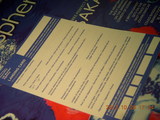 Alas, this time around I didn't have enough Dividend Miles
to get first-class passage to and from Europe,
so I ended up traveling in coach class.
"I heard a rumor they still have coach on airlines."
Well, I can assure you, it's true, they still do.
Alas, this time around I didn't have enough Dividend Miles
to get first-class passage to and from Europe,
so I ended up traveling in coach class.
"I heard a rumor they still have coach on airlines."
Well, I can assure you, it's true, they still do.
I was lucky enough that the airliner wasn't sold out, so there were empty seats around me. I made my flight from Phoenix (PHX) to Houston (IAH) and then on to London Heathrow (LHR).
You know what's scary? I saw a web page listing the thirty airports with the most passengers and I've been to twenty-three of them. The other scary thing is that most of the people I run into on these eclipse trips have vaster travel experience than I do.
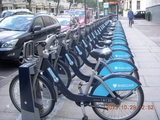 So I went to Bookings.com before my trip where clicked and clacked
my way to a reservation at the Millennium Gloucester Hotel
right near a bunch of cool London museums
and right on the tube line from Heathrow Airport.
I rode the London Underground, the "tube,"
and I showed up at the Millennium Gloucester Hotel
all smiling and heppy.
So I went to Bookings.com before my trip where clicked and clacked
my way to a reservation at the Millennium Gloucester Hotel
right near a bunch of cool London museums
and right on the tube line from Heathrow Airport.
I rode the London Underground, the "tube,"
and I showed up at the Millennium Gloucester Hotel
all smiling and heppy.
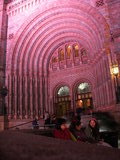 My smile quickly turned into a frown
when the front desk agent at the Millennium Gloucester Hotel
informed me I had no reservation.
I whipped out my piece of paper from Booking.com
as if to say, "So there!"
The date on the paper was 2013 November 17,
not the 2013 October 29 I was counting on.
I never clicked on November 17, or anything near it,
but I guess the web page changed the date
before asking me to confirm it.
I would have been a lot happier
if it had reserved the night I asked for.
Instead of £110 from the web-page offer,
the Millennium Gloucester had a room available for £280,
but suggested the Holiday Inn across the street might be cheaper.
It was cheaper, but still £180, a lot more than £110.
I figured I would pay the extra £70 now
and get a refund for my unwanted November-17 booking later.
(When I got home,
Bookings.com and the Millennium Gloucester Hotel agreed
that my £110 booking for 2013 November 17
was non-refundable.
Too bad for me!)
My smile quickly turned into a frown
when the front desk agent at the Millennium Gloucester Hotel
informed me I had no reservation.
I whipped out my piece of paper from Booking.com
as if to say, "So there!"
The date on the paper was 2013 November 17,
not the 2013 October 29 I was counting on.
I never clicked on November 17, or anything near it,
but I guess the web page changed the date
before asking me to confirm it.
I would have been a lot happier
if it had reserved the night I asked for.
Instead of £110 from the web-page offer,
the Millennium Gloucester had a room available for £280,
but suggested the Holiday Inn across the street might be cheaper.
It was cheaper, but still £180, a lot more than £110.
I figured I would pay the extra £70 now
and get a refund for my unwanted November-17 booking later.
(When I got home,
Bookings.com and the Millennium Gloucester Hotel agreed
that my £110 booking for 2013 November 17
was non-refundable.
Too bad for me!)
I checked into the Holiday Inn and went out to see a small musical-instruments museum, the Science Museum, my old friend the Victoria and Albert (V&A), and the Natural History Museum. I was too tired to want to see a show, so I had dinner at a local Indian restaurant and went to bed in my now-very-expensive hotel room.
I decided to sign up for one of those London bus tours the next morning.
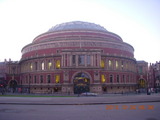 I got up Wednesday morning,
went for a run in Hyde Park,
and showed up for my London bus tour.
After rounding up all the tourists,
our bus took us to a photo opportunity at Westminster Cathedral
and a brief tour of Saint Paul Cathedral.
The original plan was to see the Changing of the Guard
at Buckingham Palace,
but somehow we were relegated to another courtyard
watching a changing of two guards on horses
from behind a white line on the pavement.
To add insult to injury,
a bunch of latecomer tourists stood in front of the white line,
in front of us,
so even these two horsemen changing guard
were lost as a photo opportunity.
I got up Wednesday morning,
went for a run in Hyde Park,
and showed up for my London bus tour.
After rounding up all the tourists,
our bus took us to a photo opportunity at Westminster Cathedral
and a brief tour of Saint Paul Cathedral.
The original plan was to see the Changing of the Guard
at Buckingham Palace,
but somehow we were relegated to another courtyard
watching a changing of two guards on horses
from behind a white line on the pavement.
To add insult to injury,
a bunch of latecomer tourists stood in front of the white line,
in front of us,
so even these two horsemen changing guard
were lost as a photo opportunity.
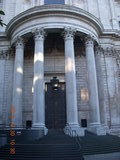 At that point,
my tour guide suggested I could catch the tube
to Heathrow Airport
from Leicester Square Station,
after a quick visit to the National Gallery.
There were a bunch of mimes outside the museum
mysteriously suspended above the ground somehow.
At that point,
my tour guide suggested I could catch the tube
to Heathrow Airport
from Leicester Square Station,
after a quick visit to the National Gallery.
There were a bunch of mimes outside the museum
mysteriously suspended above the ground somehow.
The tube ride to Heathrow Airport, Terminal Four, was pleasant enough, no problems getting my seat on Kenya Airways and a pleasant nine-hour flight to Nairoba (NBO). After three seats with not-working video monitor systems, I managed to see the new, awful "Star Trek" movie, the bad re-hash of Khan. Again the flight wasn't anywhere near sold out, so I got two armrests for my overnight journey and arrived in Nairobi (NBO) well rested.
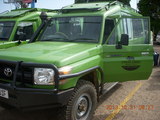 The wait in Nairobi (NBO) was pleasant enough, I guess,
and I caught my one-hour flight to Entebbe (EBB).
I'm told that NBO burned down and they were rebuilding it
and this international transfer terminal was the old
car parking lot.
The wait in Nairobi (NBO) was pleasant enough, I guess,
and I caught my one-hour flight to Entebbe (EBB).
I'm told that NBO burned down and they were rebuilding it
and this international transfer terminal was the old
car parking lot.
After two long, overnight flights, the fifty-minute NBO-EBB flight was a breeze, we spent about an hour getting organized in the parking lot, and then thirty-and-some of us were off to Kampala in several large vans.
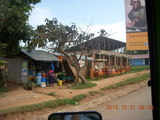 The drive was definitely third world with
aggressive traffic and a mix of pedestrians,
bicycles, motorcyclists, and cars vying
for whatever space was available anywhere on the road.
It was nothing like India with its constant honk of horns,
but it wasn't like driving in Phoenix either.
As an American,
I had to get used to being on the left side of the roadway,
something my British travel-mates were already accustomed to.
The drive was definitely third world with
aggressive traffic and a mix of pedestrians,
bicycles, motorcyclists, and cars vying
for whatever space was available anywhere on the road.
It was nothing like India with its constant honk of horns,
but it wasn't like driving in Phoenix either.
As an American,
I had to get used to being on the left side of the roadway,
something my British travel-mates were already accustomed to.
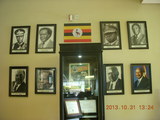 Going to a foreign country means seeing interesting and different
advertisements.
In this case, I noticed a repeated theme for Coca Cola,
"open happiness" on Coca-Cola-red signs on storefronts.
Going to a foreign country means seeing interesting and different
advertisements.
In this case, I noticed a repeated theme for Coca Cola,
"open happiness" on Coca-Cola-red signs on storefronts.
The Kampala Sheraton had armed guards and a metal-detector check. It made me wonder what my running was going to be like in Uganda, but I figured maybe this was just the case at a fancy hotel in Kampala and things would be easier once we got out in to the Ugandan countryside, which was exactly the case.
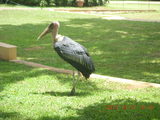 I enjoyed a short run in and around the hotel grounds
at the Sheraton.
The people who worked in the lobby were helpful
in directing me where I could run,
even though they probably thought I was a crazy man.
I saw a couple types of large, strange birds on the hotel grounds.
I enjoyed a short run in and around the hotel grounds
at the Sheraton.
The people who worked in the lobby were helpful
in directing me where I could run,
even though they probably thought I was a crazy man.
I saw a couple types of large, strange birds on the hotel grounds.
The electrical wiring turned out to be a bit of a puzzle. While I had connectors and converters for European mains, I only had one plug that fit English mains, which are different. Figuring my charging cables for computer, cell phone, et cetera were all okay with 120 volts in the United States and 220 volts elsewhere, I plugged my U.S. extension cords into the 220-volt line. The only casualty was my electric shaver whose recharger turned out not to be happy with 220 volts. Whatever fried internally in the charger was nice enough to fail quietly without any stink, smoke, or fire, and I found a replacement charger on eBay when I got home.
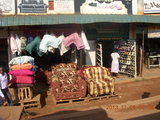 Getting seventy people into vans for our trip north
was like herding cats,
so our 8:00 departure was more like 8:30.
We enjoyed the six-hour drive to Chobe Safari Lodge
near Murchison Falls National Park.
Getting seventy people into vans for our trip north
was like herding cats,
so our 8:00 departure was more like 8:30.
We enjoyed the six-hour drive to Chobe Safari Lodge
near Murchison Falls National Park.
Much of the six-hour drive was on paved roads, some was on good dirt road, and some was on dirt road that wasn't so good. Most of the way, along the way, were villages with shops facing the highway. Advertisement placed high on the storefronts were common, mostly promoting some kind of mobile-phone service.
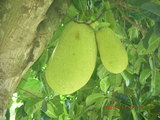 There was a particularly-annoying stretch where good road
was punctuated by periodic speed bumps
severe enough that we had to come to almost a complete stop
for each one.
Spending several tens of minutes
stopping, rolling our way over these, and starting again
was a painful process of travel progress.
There was a particularly-annoying stretch where good road
was punctuated by periodic speed bumps
severe enough that we had to come to almost a complete stop
for each one.
Spending several tens of minutes
stopping, rolling our way over these, and starting again
was a painful process of travel progress.
I learned that Uganda was in the midst of a mobile-phone revolution. Maybe ten percent of Uganda has running water or electricity, but maybe ninety percent have mobile phones, often charged at solar-powered stations in the village center. It's their lifeline, not only for communication but for commerce. The mobile-phone companies have become the banks as people put money "in their phones" and spend it "from their phones" as needed.
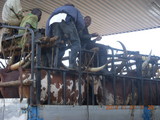 As convenient as we temperate-zone people find utilities,
the Ugandan climate and rain ensure that people in huts
won't freeze, boil, or starve.
Nights are 20°C, days are 30°C,
and a lot of stuff grows wild in the rainy, equatorial ecosystem.
There's nothing quaint or charming about poverty,
it involves bugs, unpalliated disease, and helplessness,
but at least Ugandan poverty is temperate and fed.
If there are paths to economic independence for poverty-stricken
Uganda,
then I believe they are communication and commerce,
and the mobile phone provides both of these.
As convenient as we temperate-zone people find utilities,
the Ugandan climate and rain ensure that people in huts
won't freeze, boil, or starve.
Nights are 20°C, days are 30°C,
and a lot of stuff grows wild in the rainy, equatorial ecosystem.
There's nothing quaint or charming about poverty,
it involves bugs, unpalliated disease, and helplessness,
but at least Ugandan poverty is temperate and fed.
If there are paths to economic independence for poverty-stricken
Uganda,
then I believe they are communication and commerce,
and the mobile phone provides both of these.
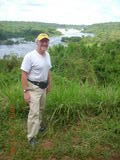 This is the first time I've seen the Nile River.
Admittedly, Uganda is a long way from Egypt and the Pyramids,
but it's still the
magnificent Nile.
This is the first time I've seen the Nile River.
Admittedly, Uganda is a long way from Egypt and the Pyramids,
but it's still the
magnificent Nile.
The dirt-road "driveway" to the lodge was about 18 Km of beautiful-scenery dirt road, twenty-five bumpy minutes. Alternative routes there would involve boats on the Nile River or aircraft to the airstrip, but we enjoyed the ride and the view. Through a runner's eyes, the road looked like an ideal place for morning exercise.
Chobe Safari Lodge is luxurious living in a wildlife-rich area with baboons and monkeys. There are also elephants, giraffes, water buffalo, hippopotamoi, and crocodiles. As these are wild things that can hurt people, the staff was very protective, and the road was off limits, at least going there by myself.
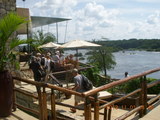
|
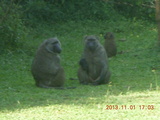
|
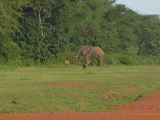
|
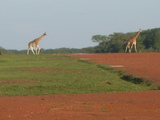
|
The staff at Chobe was all about making the bounty of the area available to the guests. One fellow who worked there was walking me around the property to show me a good morning running route. He pointed out baboons, mostly harmless, and water buffalo, to be given a wide berth. Then his radio-walkie-talkie went off. "There's an elephant on the airstrip!" The next thing I knew, we were off by golf cart to the front of the property where, sure enough, we could see an elephant on the airstrip, plus a couple of giraffes.
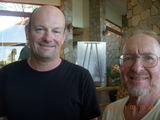 Nick James gave the pre-eclipse talk.
There isn't much to say as most of us have been
to a solar eclipse and knew the
basics.
While most of the newcomers also know something,
some are truly new.
So a brief briefing on eclipses is warranted on an eclipse tour
and there is information specific to this eclipse to cover.
Eighteen seconds of totality is short enough to warrent
special advice like,
"Don't spend the first minute fiddling with a camera"
and
"You're not going to see Mercury so don't look for it."
Short eclipses give more dramatic pre-eclipse and post-eclipse
Baily's beads and diamond rings
as well as a better view of the chromosphere,
the red layer just outside the main-sun photosphere
that's too bright to look at.
Nick handled this responsibility well and,
over the course of the trip,
proved delightful company as well.
Nick James gave the pre-eclipse talk.
There isn't much to say as most of us have been
to a solar eclipse and knew the
basics.
While most of the newcomers also know something,
some are truly new.
So a brief briefing on eclipses is warranted on an eclipse tour
and there is information specific to this eclipse to cover.
Eighteen seconds of totality is short enough to warrent
special advice like,
"Don't spend the first minute fiddling with a camera"
and
"You're not going to see Mercury so don't look for it."
Short eclipses give more dramatic pre-eclipse and post-eclipse
Baily's beads and diamond rings
as well as a better view of the chromosphere,
the red layer just outside the main-sun photosphere
that's too bright to look at.
Nick handled this responsibility well and,
over the course of the trip,
proved delightful company as well.
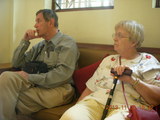 This evening we got a special treat.
In terrestrial-solar-eclipse circles there is a special moment
in history.
On 1973 June 30 a bunch of scientists
managed to get a supersonic Concorde airplane
to follow the moon's shadow across Africa for 74 minutes.
The moon is going 2000 miles per hour (MPH),
so its umbral shadow is going 2000 MPH.
At the equator, the earth rotates at 25000 miles per 24 hours,
or about 1000 MPH.
The difference, 1000 MPH, is attainable in a fast airplane,
like the Concorde 001 prototype, made available in 1973.
With the roof replaced with transparent material,
the fifteen people on board were able to watch the sun's corona
for an extended period of time,
and to answer scientific questions not answerable
in the mere 7.5 minutes of a maximal surface eclipse.
(For example, does the corona experience the same
five-minute-period variation as the photosphere?)
This evening we got a special treat.
In terrestrial-solar-eclipse circles there is a special moment
in history.
On 1973 June 30 a bunch of scientists
managed to get a supersonic Concorde airplane
to follow the moon's shadow across Africa for 74 minutes.
The moon is going 2000 miles per hour (MPH),
so its umbral shadow is going 2000 MPH.
At the equator, the earth rotates at 25000 miles per 24 hours,
or about 1000 MPH.
The difference, 1000 MPH, is attainable in a fast airplane,
like the Concorde 001 prototype, made available in 1973.
With the roof replaced with transparent material,
the fifteen people on board were able to watch the sun's corona
for an extended period of time,
and to answer scientific questions not answerable
in the mere 7.5 minutes of a maximal surface eclipse.
(For example, does the corona experience the same
five-minute-period variation as the photosphere?)
Don Liebenberg was one of those scientists, he was one of the members of our tour, and he gave a short description of the flight. I got to know him and his wife Norma on this tour.
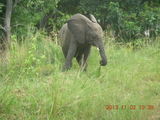 Saturday was Murchison-Falls-tour day.
We drove to a boat landing near another lodge on the Nile,
took a boat ride up-river to see the falls and back,
had lunch at the nearby lodge,
and drove back to the Chobe lodge.
Saturday was Murchison-Falls-tour day.
We drove to a boat landing near another lodge on the Nile,
took a boat ride up-river to see the falls and back,
had lunch at the nearby lodge,
and drove back to the Chobe lodge.
There was significant fanfare at the Chobe Safari Lodge as Ugandan President Museveni decided he wanted to see the eclipse (I don't blame him), decided he wanted to stay someplace nice (this was a really good place), and kept a security detail (which was polite and courteous). The Presidential Suite actually had the president staying there. Needless to say, the Chobe Safari Lodge wasn't going to have spare guides to go running with guests.
My morning run was around the hotel property a bunch of times. I saw baboons on my morning run, but no water buffalo. The hippos were submerged in the Nile waters.
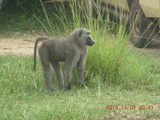 The drive was pleasant,
twenty-five minutes on the hotel dirt "driveway,"
a stretch on a smooth paved road,
and quite a bit on a one-lane, two-tire-track dirt road.
The driver would stop when interesting game was afoot.
We saw elephants, various antelope, giraffes,
and even an interesting bird or two.
When we got to our boat pick-up point,
we saw monkeys and baboons
we were even charged, briefly and half-heartledly,
by a small elephant, presumably young.
(How do you stop an elephant from charging?
Take away his credit card. Yuk, yuk, yuk.)
There was a live, acoustic
group
singing
what seemed like local tunes with a western-style four-four rhythm.
The drive was pleasant,
twenty-five minutes on the hotel dirt "driveway,"
a stretch on a smooth paved road,
and quite a bit on a one-lane, two-tire-track dirt road.
The driver would stop when interesting game was afoot.
We saw elephants, various antelope, giraffes,
and even an interesting bird or two.
When we got to our boat pick-up point,
we saw monkeys and baboons
we were even charged, briefly and half-heartledly,
by a small elephant, presumably young.
(How do you stop an elephant from charging?
Take away his credit card. Yuk, yuk, yuk.)
There was a live, acoustic
group
singing
what seemed like local tunes with a western-style four-four rhythm.
Among other touristy ornaments was a two-meter globe with countries painted on it, so I was able to point out my trip from Phoenix in Arizona to Murchison Falls National Park in Uganda. It's a long, long way.
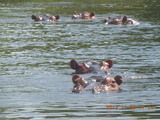 Then we piled onto boats for our up-river adventure
on the broad Nile.
Our guide pointed out various life forms
from hippopotomoi and crocodiles
to antelopes and birds,
and even some more elephants.
Among the birds,
there were bee-killer birds and eagles to admire.
Every once in a while,
a hippo would rise out of the water and yawn,
quite a spectacular sight and one usually missed
by those of us who didn't already have cameras ready.
Some of the plants were described to us.
I forget most, but I remember the bright-green papyrus plants.
Of course our course took us alongside boats
with passengers from our own tour group.
Then we piled onto boats for our up-river adventure
on the broad Nile.
Our guide pointed out various life forms
from hippopotomoi and crocodiles
to antelopes and birds,
and even some more elephants.
Among the birds,
there were bee-killer birds and eagles to admire.
Every once in a while,
a hippo would rise out of the water and yawn,
quite a spectacular sight and one usually missed
by those of us who didn't already have cameras ready.
Some of the plants were described to us.
I forget most, but I remember the bright-green papyrus plants.
Of course our course took us alongside boats
with passengers from our own tour group.
This was, we were told, the stretch of water used to film "The African Queen" with Humphrey Bogart and Katharine Hepburn. That was back in the day when they used actual places to make movies, not just stage sets, and certainly not computer-generated images for setting.
We saw Murchison falls in the distance, a torrent of water spraying and rushing through a narrow gap. Nobody talked about going over the falls, in a barrel or any other way, or even going much closer than we did. There was a path that went to toilets (nobody had to) and I think that path works it way right up to the falls, but we weren't offered time to hike there, not with the rest of the boat passengers hungry for lunch in an hour.
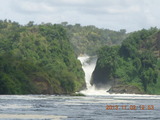 Lunch was good safari-lodge buffet fare and better conversation.
One of the advantages of pampered-tourist lodge-buffet fare
is that I can ignore my travel doctor's warnings about buffet food.
The usual warning I get, trip after trip,
is stay away from buffets because the food often sits out for a while
and sits out in places where the bacteria and bugs in the air
aren't really things I want to ingest.
These are clean, well-kept places and food is put out and consumed
without a long, intermediate stay in the open.
Nobody in our Astro-trails group
had any food problems that I know of on this trip.
Lunch was good safari-lodge buffet fare and better conversation.
One of the advantages of pampered-tourist lodge-buffet fare
is that I can ignore my travel doctor's warnings about buffet food.
The usual warning I get, trip after trip,
is stay away from buffets because the food often sits out for a while
and sits out in places where the bacteria and bugs in the air
aren't really things I want to ingest.
These are clean, well-kept places and food is put out and consumed
without a long, intermediate stay in the open.
Nobody in our Astro-trails group
had any food problems that I know of on this trip.
Other than more of the same game and a good elephant close-up (with no confrontation or charging), the drive back was uneventful, and dinner was more of the same. (We were individually searched by the President's protection, reasonably and courteously, upon entering the resort grounds.) That evening I heard a loud munching sound (Bill Watterson would have described it in his "Calvin and Hobbes" comic strip as the mangling and crushing of human bones and Garrison Keiler would have called it "prehistoric" in one of his radio stories) and I went to the window. Right below our balcony was a full-size adult hippopotamus happily feasting on the grass between our rooms and the pool. He didn't seem to think a one-tonne-plus pachyderm mowing the lawn at a fancy resort was out of place and I realized that, here in Chobe Safari Lodge, he wasn't out of place at all. Human-tourist and local animal co-existence was key to making a place like this work.
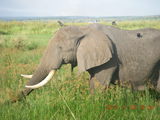 Much has been said about "eco-tourism,"
minimum-impact travel as opposed to
the usual commercial mass-market tourism.
Our experiences in Uganda clearly weren't eco-tourism in that sense.
But there was a clear sense here,
and in other places I visited in Uganda,
that the connection between preserving Uganda's fauna
and maintaining its tourism industry was clear.
I sensed a bit more than that,
a general pride in Uganda's recent history
of preserving its wild animals,
preserving the wild so those animals have a place to be wild,
and preserving the wildness of those animals
even above tourist convenience.
I was told that really bad things happen to poachers caught
in the national-park areas,
(maybe worse things than happened to American-frontier poachers,
we called them "cattle rustlers" and treated them to
"necktie parties").
Many of us, including myself,
were glad to see gorillas, elephants, chimpanzees,
and other inhabitants of the African equatorial wild,
preserved by this kind of enthusiasm.
I'm glad my tourism contributes to this preservation
and may it continue for a long time.
Much has been said about "eco-tourism,"
minimum-impact travel as opposed to
the usual commercial mass-market tourism.
Our experiences in Uganda clearly weren't eco-tourism in that sense.
But there was a clear sense here,
and in other places I visited in Uganda,
that the connection between preserving Uganda's fauna
and maintaining its tourism industry was clear.
I sensed a bit more than that,
a general pride in Uganda's recent history
of preserving its wild animals,
preserving the wild so those animals have a place to be wild,
and preserving the wildness of those animals
even above tourist convenience.
I was told that really bad things happen to poachers caught
in the national-park areas,
(maybe worse things than happened to American-frontier poachers,
we called them "cattle rustlers" and treated them to
"necktie parties").
Many of us, including myself,
were glad to see gorillas, elephants, chimpanzees,
and other inhabitants of the African equatorial wild,
preserved by this kind of enthusiasm.
I'm glad my tourism contributes to this preservation
and may it continue for a long time.
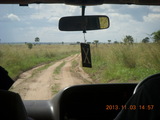 Today is eclipse day, fairly late in the afternoon,
plenty of time for me to take a long morning run.
With
President Museveni
staying in the hotel,
where I can run is strictly limited by security,
running off premises requires a not-available guide,
and I get bored running back and forth
too many times on the same path,
so I did a short run instead.
Today is eclipse day, fairly late in the afternoon,
plenty of time for me to take a long morning run.
With
President Museveni
staying in the hotel,
where I can run is strictly limited by security,
running off premises requires a not-available guide,
and I get bored running back and forth
too many times on the same path,
so I did a short run instead.
After an early lunch, we piled into our vans and launched north to our chosen eclipse site. As soon as we got out of the hotel's 18-Km dirt driveway, the vans all turned south, away from the eclipse site, and pulled into a petrol station a few miles from the driveway. (It seemed like Libya all over again where we added an hour an a half to allow for unforeseen delays and the first thing the coach drivers did was pull into a petrol station and spend all 90 minutes filling their fuel tanks they could have (and should have) filled during the night, before we boarded.) I thought, well maybe this was clever planning, adding a little travel time to the eclipse to avoid an nearly an hour of tough dirt-road driving and fuel expense just so we could start with full tanks. When I asked afterward about it, I was told no, it was the same sort of abuse, just with smaller delay and less-dire planning consequence. I have no problem making the stop, but it should have been planned that way.
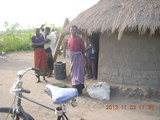
|
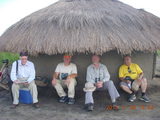
|
I made the decision that eighteen seconds was way too short to worry about picture taking. I figured somebody else would get a far-better picture than my point-and-shoot anyway. So I set up next to my friend Bill with new, digital stuff and Nigel with all his cameras and stuff, stripped down to my athletic gear, and did what I usually do when I have some time to kill. I went for a run along the dirt road.
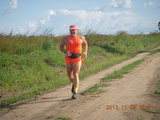 As I made my way down the two-ruts-in-the-dirt roadway,
I encountered a few folks on motorcycles who waved eagerly
at the strange white fellow in the bright-orange outfit.
(No blue running gear this trip
because tsetse flies like blue,
so I got bright yellow, orange, and red outfits.)
When I got to 2.5 kilometers on my GPS watch
I turned around to make my effort five even.
About 1 Km from my finish there was a fellow walking my way
with two small children who decided to run with me.
It wasn't hard for them to keep up, even barefoot on the dirt road,
and the three of us headed at my pace back to the eclipse crowd.
As I made my way down the two-ruts-in-the-dirt roadway,
I encountered a few folks on motorcycles who waved eagerly
at the strange white fellow in the bright-orange outfit.
(No blue running gear this trip
because tsetse flies like blue,
so I got bright yellow, orange, and red outfits.)
When I got to 2.5 kilometers on my GPS watch
I turned around to make my effort five even.
About 1 Km from my finish there was a fellow walking my way
with two small children who decided to run with me.
It wasn't hard for them to keep up, even barefoot on the dirt road,
and the three of us headed at my pace back to the eclipse crowd.
The clouds rolled by, the sky grew lighter and darker while hopes rose and fell. Would we see the eclipse, or would we be "clouded out"? I've been awesomely lucky to see all eight of my eclipse attempts, so would this be nine for nine or would I finally have a failure? The answer was sort-of "YES" for both.
The thin layer of cloud didn't dissipate, but the shape of the sun was still visible. Actually, a strange benefit was we could look with naked eyes at the crescent face of the partially-eclipsed sun. I realized I could aim my point-and-shoot at that without worrying about filters or burning anything out, so I hastily prepared my tripod and screwed my camera onto it. Realizing it would be really awful spending thirty seconds doing that and missing the eighteen seconds I cared about, I did what I could, set up the tripod, and continued my gaze skyward.
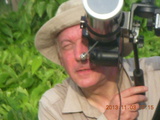 The moment came and I actually watched the crescent become beads
and a ring of cloudy corona in the sky.
I saw a moment that might have been the diamond ring,
confirmed by the one
picture
I did take with my little pocket camera
before my not-well-set-up tripod collapsed.
I let the camera fall down and watched the sun come back,
brief diamond ring,
maybe some beads,
and a smiley-face thin partial sun in the sky
that I could actually watch.
So maybe I didn't get shadow bands or
chromosphere views with prominences
or coronal shape or any outer corona at all,
but I did get to see the eclipse and I got to see
before and after in a way I've not seen before.
And, funny thing, there is one bright pixel in my one photo,
so I caught the diamond ring as an actual point of light,
not the usual blobby smear of brilliant whiteout that most
diamond-ring pictures show.
The moment came and I actually watched the crescent become beads
and a ring of cloudy corona in the sky.
I saw a moment that might have been the diamond ring,
confirmed by the one
picture
I did take with my little pocket camera
before my not-well-set-up tripod collapsed.
I let the camera fall down and watched the sun come back,
brief diamond ring,
maybe some beads,
and a smiley-face thin partial sun in the sky
that I could actually watch.
So maybe I didn't get shadow bands or
chromosphere views with prominences
or coronal shape or any outer corona at all,
but I did get to see the eclipse and I got to see
before and after in a way I've not seen before.
And, funny thing, there is one bright pixel in my one photo,
so I caught the diamond ring as an actual point of light,
not the usual blobby smear of brilliant whiteout that most
diamond-ring pictures show.
Given the lack of true solar-eclipse spectacle, I suspect our local-farm, thatched-roof-hut hosts had to wonder why people would travel intercontinental distances for what we just saw, but they were nice enough about it and will have stories to tell for years, maybe even decades or generations, about the strange people with funny accents who appeared 2013 November 3, one Sunday afternoon.
On our drive back we saw one or two big thunderstorms (what could have been), we had yet another sumptuous dinner, and went to sleep for another day.
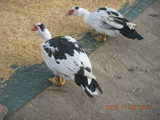
|
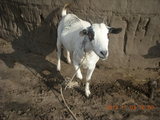
|
This time I reached for my glasses on the computer, put them on, and then felt movement I didn't expect from my touch pad. A rather large beetle, a cockroach I think, decided my touch pad was a great place to stay. I took a flash picture of him before doing anything (for posterity, and to see what really was sitting on my touch pad). Then, using a DVD case and a book on Uganda, I escorted this extra guest outside our room and figured maybe the mosquito net wasn't as good a bug filter as I hoped. On the whole, I was happier to have this animal, rather than last night's hippopotamus, actually inside our room as it would have been a lot harder to get a hippo already in our room to go back outside. (I don't think pachyderms "shoo" any more easily than bovines, and I know how hard it is to clear cows from someplace they want to be and I don't want them to be. "Shoo cow, go on, come on, get out, go, shoo!")
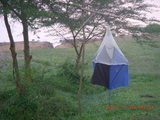 After a short run and
our last breakfast at Chobe Safari Lodge,
our party split into three groups (as I figure it).
One group was going back to Entebbe to head back to London,
the second was off to hunt for gorillas in some remote place,
and my group was off to hunt for chimpanzees.
After a short run and
our last breakfast at Chobe Safari Lodge,
our party split into three groups (as I figure it).
One group was going back to Entebbe to head back to London,
the second was off to hunt for gorillas in some remote place,
and my group was off to hunt for chimpanzees.
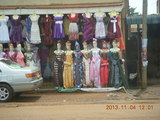 The drive from Chobe Safari Lodge
to Mountains of the Moon Hotel was considerable,
about ten hours,
and all of it was on dirt roads of varying quality.
The original plan was go halfway,
stay at a nice hotel,
and finish the journey the next day.
Alas, the hotel had double booked enough rooms
that they could not put us up in their nicer rooms.
Our tour management scrambled on line
and using local contacts
to find a truly excellent solution in
Kluge's Guest Farm in Kabahango
(if I read
the sign correctly)
where we stayed.
But now today's drive ended up being something over eight hours.
The drive from Chobe Safari Lodge
to Mountains of the Moon Hotel was considerable,
about ten hours,
and all of it was on dirt roads of varying quality.
The original plan was go halfway,
stay at a nice hotel,
and finish the journey the next day.
Alas, the hotel had double booked enough rooms
that they could not put us up in their nicer rooms.
Our tour management scrambled on line
and using local contacts
to find a truly excellent solution in
Kluge's Guest Farm in Kabahango
(if I read
the sign correctly)
where we stayed.
But now today's drive ended up being something over eight hours.
It was a pretty drive with a couple of stops. I feel sorry for anybody who felt stretched by sitting-still-in-a-bumpy-vehicle time or by time between potty stops. I was lucky enough to be afflicted by neither during our beautiful journey through the Uganda countryside.
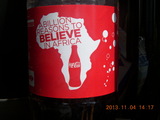 We traveled in the same groups in the same vans with the same drivers
to and from Murcheson Falls all the way through to our return
to Entebbe.
I happened to like my van company,
in fact I got to know them better and like them better as we went,
so that worked well for me.
We traveled in the same groups in the same vans with the same drivers
to and from Murcheson Falls all the way through to our return
to Entebbe.
I happened to like my van company,
in fact I got to know them better and like them better as we went,
so that worked well for me.
I was also impressed that our drivers knew where to go in all the places we were. It's not like there were big signs pointing the way.
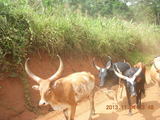 In this lovely mountainous area of Uganda
we followed some seriously back-country roads
to Kluge's Guest Farm.
We had about an hour before dinner
and I didn't waste the opportunity to run
a couple of kilometers, one out and one back.
All the kids along the roadway were out playing,
so they formed a cheering section
for the amazing red-headed white guy in the bright-yellow outfit.
Think of me being like an Olympian running along,
except in extreme slow motion.
(It's like Steve Austin in
"The Six Million Dollar Man" on television
where they would have him in slow motion
to show how fast he was going.
Now they would have some fancy computer graphics,
maybe streaking lines behind him, something cool looking,
but I think it was more fun when special effects were simpler.
Making fast things happen fast on television
looks Keystone-Cops cheesy
like when they made Kitt Car go faster
by speeding up the video on "Knight Rider.")
In this lovely mountainous area of Uganda
we followed some seriously back-country roads
to Kluge's Guest Farm.
We had about an hour before dinner
and I didn't waste the opportunity to run
a couple of kilometers, one out and one back.
All the kids along the roadway were out playing,
so they formed a cheering section
for the amazing red-headed white guy in the bright-yellow outfit.
Think of me being like an Olympian running along,
except in extreme slow motion.
(It's like Steve Austin in
"The Six Million Dollar Man" on television
where they would have him in slow motion
to show how fast he was going.
Now they would have some fancy computer graphics,
maybe streaking lines behind him, something cool looking,
but I think it was more fun when special effects were simpler.
Making fast things happen fast on television
looks Keystone-Cops cheesy
like when they made Kitt Car go faster
by speeding up the video on "Knight Rider.")
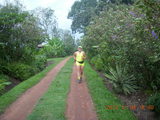 After a couple of the kids answered my "hi" with "how are you?"
I remembered the greeting exchange I used in Zambia.
In any culture or community there is some kind of greeting
that establishes a conversation.
Use less than that and you seem curt or rude,
use more and you come across as wasting my time.
"Hi" or "good morning" seem to work in the United States,
most of Europe, and China,
but Zambia had the extra step of asking "how are you?"
and answering "fine."
It doesn't take long and it's part of the greeting exchange.
When I asked "how are you" as part of my greeting with people,
particularly in this eastern part of Uganda,
I found it easier as I had completed our greeting,
even as I was running along greeting people along the way.
After a couple of the kids answered my "hi" with "how are you?"
I remembered the greeting exchange I used in Zambia.
In any culture or community there is some kind of greeting
that establishes a conversation.
Use less than that and you seem curt or rude,
use more and you come across as wasting my time.
"Hi" or "good morning" seem to work in the United States,
most of Europe, and China,
but Zambia had the extra step of asking "how are you?"
and answering "fine."
It doesn't take long and it's part of the greeting exchange.
When I asked "how are you" as part of my greeting with people,
particularly in this eastern part of Uganda,
I found it easier as I had completed our greeting,
even as I was running along greeting people along the way.
An Italian gentleman presented a terrific buffet dinner and we had a delightful evening and a good night's sleep.
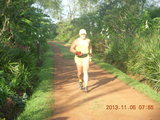 Our drive to Fort Portal and Mountains of the Moon Hotel
was in the afternoon and we had all morning
to do as we pleased.
I pleased to run 8 Km (good for me these days) at dawn
so I saw the villagers waking up.
Our drive to Fort Portal and Mountains of the Moon Hotel
was in the afternoon and we had all morning
to do as we pleased.
I pleased to run 8 Km (good for me these days) at dawn
so I saw the villagers waking up.
One offering was a walk in the forest in this truly-lovely place. I joined about a dozen others as we strolled along the path, sometimes slippery, sometimes steep, and both in one or two places (whee!). One woman found herself submerged in a hole up to mid-calf, quite a surprise, and we had to remove her, and then her boot. Fortunately, she was fine.
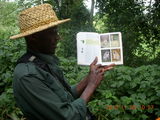 The drive was mercifully short after yesterday's marathon.
Dirt roads became paved as we approached Fort Portal
and Mountains of the Moon Hotel.
The drive was mercifully short after yesterday's marathon.
Dirt roads became paved as we approached Fort Portal
and Mountains of the Moon Hotel.
There are real mountains in the mountainous part of Uganda. The highest is Margherita Peak on Mount Stanley 5110 meters (16700 feet). The mountains as backdrop make the scenic views more scenic.
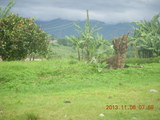 The night before, I asked a fellow at the front desk
for a good morning run from Mountains of the Moon Hotel.
He gave me a suggested run through the town and even drew me a map.
So I ran past the gate out of the hotel
and up a hill past the Tooro Botanical Gardens
and an elementary school,
down a hill through a neighborhood to the main road
that is the highway to Kampala.
I followed the main road until it ended in a T-intersection
where I knew Mountains of the Moon Hotel was to my right.
(Any minimum sense of direction I made have used
was buoyed by looking at my GPS running watch.)
Then I followed my GPS back to the hotel,
thankful for the technological substitute
for the sense of direction I lack.
The night before, I asked a fellow at the front desk
for a good morning run from Mountains of the Moon Hotel.
He gave me a suggested run through the town and even drew me a map.
So I ran past the gate out of the hotel
and up a hill past the Tooro Botanical Gardens
and an elementary school,
down a hill through a neighborhood to the main road
that is the highway to Kampala.
I followed the main road until it ended in a T-intersection
where I knew Mountains of the Moon Hotel was to my right.
(Any minimum sense of direction I made have used
was buoyed by looking at my GPS running watch.)
Then I followed my GPS back to the hotel,
thankful for the technological substitute
for the sense of direction I lack.
It was fun being a white guy running in an orange outfit. Everybody looked and most answered when I greeted them "hi" and "how are you" along the busy highway. I remembered to run on the right side of the road, facing traffic.
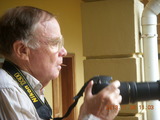
|
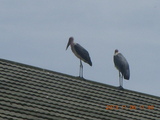
|
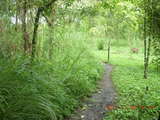 I talked my roommate Bill into joining me
checking out the Tooro Botanical Garden with me.
We walked over there and paid a few dollars,
perhaps a few dollars more than the straight conversion
from Uganda schillings to United States dollars,
and got a terrific guide named Lawrence for our tour.
He showed us how they dry leaves using sunlight
to make herbal remedies.
They started with a solar still,
except instead of extracting water from it
(like we do in the Arizona-desert version),
they throw the water away and use the hot, arid air it creates
to dry out the leaves they're processing.
Lawrence walked us down the hill
(note to self, what goes down must come back up)
and showed Bill and me various trees and other plants.
Tooro Botanical Garden was doing studies with trees
to see if they grew better planted in groves of like trees
or in mixed groves with other trees.
They also were potting tens of thousands of sprigs
that would grow into trees when planted.
As in other Uganda nature environments,
there was a strong theme of preservation
and respect for native plants and animals.
As a tourist,
I'm happy when my role as a tourist
and my money as a tourist,
generate support for preservation and protection of nature.
I talked my roommate Bill into joining me
checking out the Tooro Botanical Garden with me.
We walked over there and paid a few dollars,
perhaps a few dollars more than the straight conversion
from Uganda schillings to United States dollars,
and got a terrific guide named Lawrence for our tour.
He showed us how they dry leaves using sunlight
to make herbal remedies.
They started with a solar still,
except instead of extracting water from it
(like we do in the Arizona-desert version),
they throw the water away and use the hot, arid air it creates
to dry out the leaves they're processing.
Lawrence walked us down the hill
(note to self, what goes down must come back up)
and showed Bill and me various trees and other plants.
Tooro Botanical Garden was doing studies with trees
to see if they grew better planted in groves of like trees
or in mixed groves with other trees.
They also were potting tens of thousands of sprigs
that would grow into trees when planted.
As in other Uganda nature environments,
there was a strong theme of preservation
and respect for native plants and animals.
As a tourist,
I'm happy when my role as a tourist
and my money as a tourist,
generate support for preservation and protection of nature.
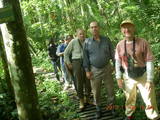 We got back to the hotel,
ate lunch,
and drove on very-tough dirt roads to
Kibale National Park
where we hoped to find chimpanzees in the wild rain forest.
We found eclipse
shirts
for sale in their gift shop,
and I think we bought them all as souvenirs.
We got back to the hotel,
ate lunch,
and drove on very-tough dirt roads to
Kibale National Park
where we hoped to find chimpanzees in the wild rain forest.
We found eclipse
shirts
for sale in their gift shop,
and I think we bought them all as souvenirs.
We were warned in our chimp-hunt briefing there was a significant chance (maybe 10%) that we would not see any chimpanzees in our trek. After all, these were wild animals, not pets, not used to people, and they go where they want to go. Our guides were armed with walkie-talkie radios and a lot of experience as watchers and listeners. The forest has many sounds and there is much to learn just learning to listen. Chimps have their own sounds, of course, but I suspect there are other signals telling where to find them. We were advised to get no nearer than five meters.
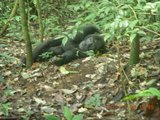 So off we went in groups of about eight tourists with guides.
They were on the radio, a sound here, a footprint there.
"Wait, wait!
They're down there, let's go!"
So down the muddy hill we went and, sure enough,
there were a couple of them lying and relaxing.
(Add cigars, cards, and poker chips and you've got a scene.)
Surrounded on three sides by large primates and remaining unflustered,
these chimps had to be somewhat used to us.
There was a flurry of screeching
(maybe they got the meeting-notice memo)
and these two were off to rejoin their friends somewhere
and it was up to us to wander around the woods to figure out where.
So off we went in groups of about eight tourists with guides.
They were on the radio, a sound here, a footprint there.
"Wait, wait!
They're down there, let's go!"
So down the muddy hill we went and, sure enough,
there were a couple of them lying and relaxing.
(Add cigars, cards, and poker chips and you've got a scene.)
Surrounded on three sides by large primates and remaining unflustered,
these chimps had to be somewhat used to us.
There was a flurry of screeching
(maybe they got the meeting-notice memo)
and these two were off to rejoin their friends somewhere
and it was up to us to wander around the woods to figure out where.
Slipping and sliding on muddy paths, at least avoiding elephant-footprint puddles, we found the chimpanzees again, this time in a few trees. It sure was neat to see them up there.
Now I have to think, as they looked down on all of us, what these apes must be thinking: "Look at those sorry excuses for primates down there, all that brainpower and I bet most of them couldn't even climb a tree." We watched them jump from branch to branch as if they didn't know about the economic recession or the rampant pornography on the newsstands in Paris or any of that kind of stuff. Who knows? Maybe they don't know and maybe they don't care. I doubt these chimpanzees would spend twenty-five hours in a stuffy jet airliner to see me sit on a tree branch.
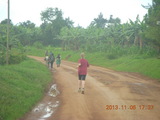 Our mission accomplished,
chimps having been well sighted by all of us,
we were guided back.
Our guides were terrific.
We had a member of our party who was having difficulty walking,
not completely immobile,
but handicapped to the point of needing a cane.
They used their radios to determine when we actually
had the chimps and then they guided her and helped her
directly to the site.
She could participate in the chimp-sighting but not the hunt.
Our mission accomplished,
chimps having been well sighted by all of us,
we were guided back.
Our guides were terrific.
We had a member of our party who was having difficulty walking,
not completely immobile,
but handicapped to the point of needing a cane.
They used their radios to determine when we actually
had the chimps and then they guided her and helped her
directly to the site.
She could participate in the chimp-sighting but not the hunt.
I don't use my binoculars much, mostly just for eclipses, but this was one time I carried them along and was very glad I did.
On the way back there was a white woman running along the road, as I do, and she stood out, as I did.
Dinner was sit-down-and-be-served from a menu, no buffet.
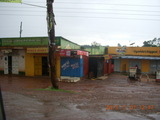
|
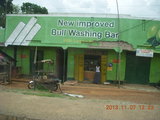
|
|
• Coke open happiness • New Improved Bull Washing Bar • Give your cooking that Midas touch! • Bwindi Impenetrable National Park — "the Wild Wild" • Uganda telecom, It's all about U • Proudly Ugandan |
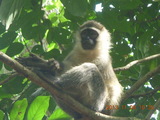 The Protea Hotel in Entebbe is right on Lake Victoria
directly across the street from Entebbe Airport (EBB).
It had armed-guards protection and I confined myself
to the hotel property for my morning run.
I noted that just about everywhere at the Protea
was a sign warning me that anything bad that happened to me
wasn't their fault—the result, I thought,
of too many lawyers.
The Protea Hotel in Entebbe is right on Lake Victoria
directly across the street from Entebbe Airport (EBB).
It had armed-guards protection and I confined myself
to the hotel property for my morning run.
I noted that just about everywhere at the Protea
was a sign warning me that anything bad that happened to me
wasn't their fault—the result, I thought,
of too many lawyers.
Bill seemed undecided between the botanical garden in Entebbe and the Uganda Wildlife Education Center (UWEC), which I suggested, one last chance to see lions. Not the wild, but not quite a zoo, this place gets their animals by rescuing them from bad situations elsewhere. With our guide's guidance, Bill and I saw tortoises, gazelles and antelopes, and zebras. We saw birds including the national Uganda stork, ostriches, parrots, peacocks, and a shoebill. The lions, alas, were, ahem, lyin' down on the job because there were being seen by their vets for shots and treatment and were not available to be seen by us. We saw white rhinoceros, crocodiles, otters, hyenas, baboons, and monkeys.
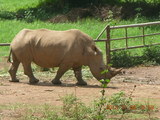 In the building were various bones from elephants (huge)
and a fully-assembled crocodile
skeleton.
In the building were various bones from elephants (huge)
and a fully-assembled crocodile
skeleton.
While Bill was enjoying the scenery and waiting for our taxi back to the hotel, I decided I had enough time to give the lions another chance. I hustled over there, still no lions, and realized I wasn't too far from the chimp island where we struck out earlier. When I headed that way, I hit paydirt. There were a zillion school kids cheering every which way and all eleven chimpanzees were there, right in front of us. It was explained that these were rescued from human environments, not from the wild, so they actually sleep inside, in a building, every night, and spend their days on this wooded island surrounded by water. There were a lot of school children here at the Uganda Wildlife Education Center (UWEC), young kids in groups, having a lot of fun, making a lot of noise, and, I figure, helping this place maintain a safe environment for their rescued animals.
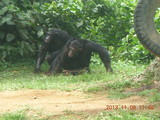 Back at the hotel I was told I could have squeezed in
the botanical garden as well,
but I was happy with what I did and happy just to spend
the afternoon chatting with my new friends
and looking forward to our electronic correspondence
until our next chance crossing,
or until 2016 March 9 in Indonesia,
the next real total-solar-eclipse opportunity.
(The eclipse 2015 March 20 goes through
the Faroe Islands north of Scotland
and Siberia, both noted for very few clear, sunny days.
Going far away for a ten-percent chance of seeing an eclipse
doesn't sound like a good plan.
Back at the hotel I was told I could have squeezed in
the botanical garden as well,
but I was happy with what I did and happy just to spend
the afternoon chatting with my new friends
and looking forward to our electronic correspondence
until our next chance crossing,
or until 2016 March 9 in Indonesia,
the next real total-solar-eclipse opportunity.
(The eclipse 2015 March 20 goes through
the Faroe Islands north of Scotland
and Siberia, both noted for very few clear, sunny days.
Going far away for a ten-percent chance of seeing an eclipse
doesn't sound like a good plan.
We left at five o'clock (17:00) for Entebbe Airport (EBB) across the street and we shared the one-hour flight to Nairobi (NBO) and the nine-hour, overnight flight to London Heathrow (LHR) on Kenya Airways. There were enough empty seats on the long flight that I had two armrests and I actually got some sleep. The video system had enough buttons broken to be not-usable.
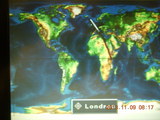 My bag arrived at London Heathrow (LHR),
customs was easy,
the express train took me to Terminal One
for my US Airways flight to Philadelphia (PHL).
Alas, the Star Alliance Club at LHR
does not honor membership in the US Airways Club
as the member airline clubs do,
only a gold-premier status.
I had gold status for a while,
but they changed some rules
and my Phoenix-Philadelphia trips fell short,
so I'm only silver.
(They had a ceremony where Doug Parker, US Airways CEO,
stomped on my gold card like the judge did in Woody Allen's
"Take the Money and Run" movie.)
So I paid £20 to use the other lounge for three hours.
My bag arrived at London Heathrow (LHR),
customs was easy,
the express train took me to Terminal One
for my US Airways flight to Philadelphia (PHL).
Alas, the Star Alliance Club at LHR
does not honor membership in the US Airways Club
as the member airline clubs do,
only a gold-premier status.
I had gold status for a while,
but they changed some rules
and my Phoenix-Philadelphia trips fell short,
so I'm only silver.
(They had a ceremony where Doug Parker, US Airways CEO,
stomped on my gold card like the judge did in Woody Allen's
"Take the Money and Run" movie.)
So I paid £20 to use the other lounge for three hours.
My flight to Philadelphia (PHL) was long but uneventful, enough empty seats so I had two armrests and got some sleep. The video system was painful to use, things took ten or fifteen seconds to respond to any button and I had to page through sixty movies if I wanted to see a movie beginning with a letter in the middle of the alphabet. Airlines pay a lot of money to have these things installed, passengers want to use them, so why not pony up whatever it costs to get software written that makes them responsive? Beyond the we-paid-for-it factor, there's a safety reason the airline should want us using their setup. When the make announcements, passengers using the installed audio-video systems hear the message, those using their own devices do not.
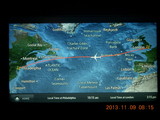 United States customs was easier than I expected from Uganda,
a brief questioning and a scan of my luggage.
I met my usual crowd at the US Airways Club in Philly
and Theresa at the desk suggested I could get better pretzels
in Terminal F,
better than the usual ones they sell in Terminals B and C,
taking a bus across the tarmac.
With perfect syzygy, bus waiting to go at each end,
no waiting for aircraft along the bus route,
and no line at the pretzel
place,
I was there and back in 22 minutes
with a handful of better Philadelphia soft
pretzels.
Thank you Theresa!
United States customs was easier than I expected from Uganda,
a brief questioning and a scan of my luggage.
I met my usual crowd at the US Airways Club in Philly
and Theresa at the desk suggested I could get better pretzels
in Terminal F,
better than the usual ones they sell in Terminals B and C,
taking a bus across the tarmac.
With perfect syzygy, bus waiting to go at each end,
no waiting for aircraft along the bus route,
and no line at the pretzel
place,
I was there and back in 22 minutes
with a handful of better Philadelphia soft
pretzels.
Thank you Theresa!
The flight from Philadelphia to Phoenix (PHX) was fine, a ten-minute wait for a gate was frustrating after all that time, and SuperShuttle got me home with a minimum of hassle. Total trip elapsed time was 39 hours, about 25 of them on airliners. No wonder I caught a case of the flu.
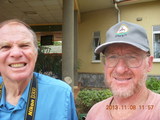 So what can I say about the trip?
I do feel violated by Bookings.com for changing the date
(okay, anybody can have software glitches)
and then handling it so poorly.
One night with them advertised at £110 ended up
being £290 instead, about USD $500.
Ouch!
So what can I say about the trip?
I do feel violated by Bookings.com for changing the date
(okay, anybody can have software glitches)
and then handling it so poorly.
One night with them advertised at £110 ended up
being £290 instead, about USD $500.
Ouch!
The trip was a joy all around. If I have another chance to visit Uganda, then I'll go cheerfully. I don't think I would want to get around completely on my own, as I did with limited success in Zambia, so I would go with some kind of guidance, as I did on my second China trip where I hired local guides for two or three days in Hongzhou and Guilin. The Ugandan people I met were genuinely friendly, not just in the hotels or the tours, but when I was out running as well.
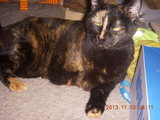 Similarly, I plan to engage Astro Trails again,
probably 2016 March 9 in Indonesia.
If another travel opportunity with them arises sooner,
then I'll take it gladly.
Similarly, I plan to engage Astro Trails again,
probably 2016 March 9 in Indonesia.
If another travel opportunity with them arises sooner,
then I'll take it gladly.
Of course I'm looking forward to 2017 August 21, the first total solar eclipse in the contiguous forty-eight states since 1976. Oregon seems to have the best weather with Wyoming not far behind, and somewhat easier to get to by light airplane from Phoenix. A lot can happen in four years, but I'm hoping to be around to see it. And then my web-page followers will have to read yet another one of my travelogues.
It wasn't so bad this time, was it?
|
16:31:13 Mountain Standard Time (MST). 149 visits to this web page. |